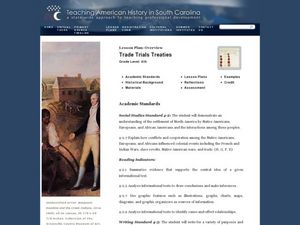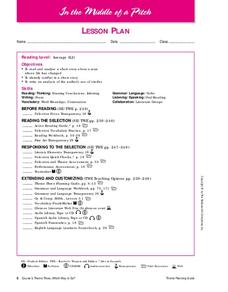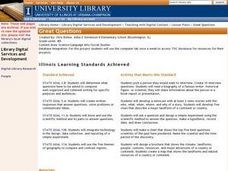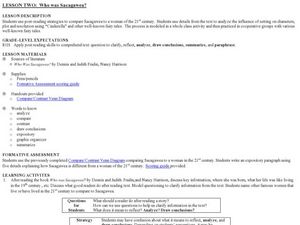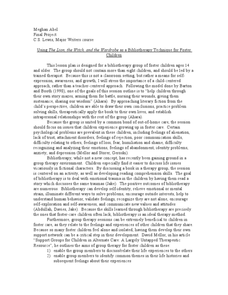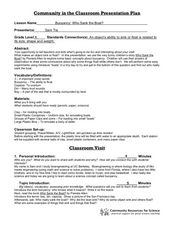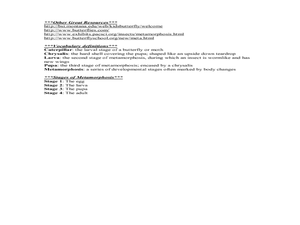Curated OER
Hot Stuff
Students investigate if heat can change the form of matter. In this physics instructional activity, students use heat sources to observe the changes in an ice cube. Students graph which heat source changed the matter the fastest.
Curated OER
Trade Trials Treaties
Fourth graders explore the trade relationships that existed in the late 1700's Colonial America. In this American history instructional activity, 4th graders examine English and Cherokee trade treaties by reviewing primary and...
Curated OER
Click, Clack, Moo: Electric Blanket Science
Young scholars read Click, Clack, Moo: Cows That Type by Doreen Cronin and discuss the similarities and differences between electric blankets and regular blankets. They brainstorm a list of reasons why the farm animals wanted electric...
Curated OER
What Are Caves All About?
Students explore materials within their science group and figure out what they can be used for. They also contribute in a group discussion about stalactites and stalagmites and create their own stalactite using the materials given to...
Curated OER
Which Way To Go?
Students prepare for and respond to literature selections. This package of lessons includes nine lessons from the American Literature series, each covering a different reading selection about a man making a key life decision. Pre-reading...
Curated OER
Health Education: Bullying
Second graders demonstrate steps to take if someone is being bullied. In this health lesson plan, 2nd graders role play situations that call for them to sop bullying behavior. Scripts and tips are included.
Curated OER
Thanksgiving Mourning
Students examine the way diverse groups can perceive a shared experience in a dramatically different light. Students read commentary written by Native American writers and find examples of different points of view. ...
Curated OER
The Tell - Tale Heart
Young scholars read The Tell Tale Heart and practice critical analysis while reflecting on its underlying meanings. For this reading lesson, students make predictions, monitor their own comprehension and adjust their reading accordingly....
Curated OER
Character, You Say? Prove It!
Students discuss character traits, and complete a character map and a Venn diagram for selected characters in their assigned text.
Curated OER
Great Questions
Fourth graders research and create questions about a famous person. They create questions in a game format, create a computer generated brochure, and develop rubrics for their finished projects.
Curated OER
HyperStudio Book Reports
Fifth graders create a HyperStudio book report after reading a novel. They work in pairs or small groups to design a HyperStudio stack about a previously-read novel. They use a variety of graphic organizers to have Students gather...
Curated OER
The Stinky Cheese Man and Other Fairly Stupid Tales
Sixth graders demonstrate the ability to process and evaluate content from a variety of sources and apply comprehension skills to the material read. They organize information for practical use and design and develop an informational...
Curated OER
Larger Than Life Figures
Students prepare for and respond to literature selections. This package includes six lessons about larger than life figures from the American Literature series, each covering a different reading selection. Pre-reading and response...
Curated OER
Elmer the Elephant
Students read "Elmer" by David McKee. They answer comprehension questions and discuss how Elmer looks and how he is different from the elephants they see in the zoo. They complete a project in which they celebrate their individual...
Curated OER
DNA Models
Students construct paper model of the DNA molecule. In this genetics lesson, students assemble paper parts that represent nucleotides into a DNA molecule. Extension ideas are also provided.
Curated OER
Urban and Rural Communities
Students discuss similarities and differences of urban and rural communities. In this urban and rural communities lesson, students compare urban and rural communities using a Venn Diagram. Students examine maps of each type...
Curated OER
Who Was Sacagawea?
Explore famous women in U.S. history by creating a Venn Diagram, The focus of this Sacagawea biography instructional activity is for young scholars to discuss the triumphs and contributions of Sacagawea's life and compare her to an...
Curated OER
Making Inferences While Identifying Similes and Metaphors
Use this lesson to study similes and metaphors and the inferred meaning. In this language arts lesson, 5th graders write their own similes and metaphors. A worksheet is provided for extension work or to check understanding as homework.
Curated OER
Zero tolerance may add up to problems
Young scholars research the issue of zero tolerance for students to have guns in schools. They realize the difficulties the schools and law enforcement officials face dealing with the issue.
Curated OER
Using The Lion, the Witch, and the Wardrobe as a Bibliotherapy Technique for Foster Children
As the title suggests, this lesson plan is designed for a foster care therapy group. C.S. Lewis' novel provides children an opportunity to discuss life issues vicariously through fictional characters. However, the discussion questions...
Curated OER
Buoyancy: Who Sank the Boat?
Students examine whether objects will sink or float. In this buoyancy instructional activity students bring in objects and experiment to see if they sink or float.
Curated OER
Bubbles
Students observe the characteristics of bubbles. In this scientific inquiry instructional activity, students use a bubble solution and a wand to make bubbles and observe their characteristics. Students identify the shape and the color of...
Curated OER
Life Cycle of the Monarch Butterfly
Third graders access prior knowledge of the monarch butterfly and discuss what they would like to know. In this Monarch Butterfly lesson plan,students read Monarch Butterfly and discuss the life cycle of the butterfly. Students...
Curated OER
Greek Inquiry Report and Presentation
Sixth graders choose from a list of researchable inquiry questions. They engage in all phases of inquiry/research process.



